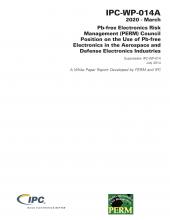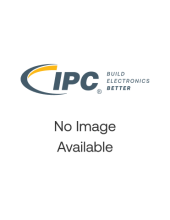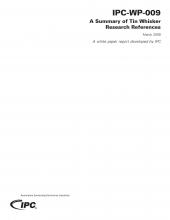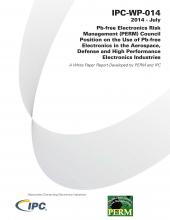Products
Pb-free materials are considered a major technology disruption to traditional Pb-based interconnect materials for electronics, which is of particular concern for the aerospace & defense industries where safety cannot be compromised and applicable reliability data remains scarce. Until validated data and modelling methods are developed, projects considering Pb-free Aerospace & Defense products and...
Lead-free electronics continues to be a concern of the aerospace, defense, and high performance products (ADHP) industries. This is primarily due to the lack of data and knowledge to: thoroughly categorize performance under harsh service conditions and provide a level of confidence in reliability assessments of Pb-free electronics equal to those for traditional tin-lead electronics. To help close...
The PERM Lead-Free Manhattan Project (LFMP) was established to identify the technology and knowledge gaps relevant to the implementation of commercially available Pb-free product in Aerospace & Defense Systems. These knowledge gaps threaten to affect the safety, performance and reliability of Aerospace & Defense systems, which cannot be compromised. Investment is required to close these knowledge...
Manufacturers of high reliability electronics have been working for many years to mitigate the deleterious effects of tin whisker formation. One highly effective means to suppress the growth of tin whiskers is to replace the pure tin plating with reflowed tin-lead solder. One approach is to fully consume the tin plating by tin-lead solder during the SMT reflow process. This phenomenon of tin...
Status of the technology discussion on the various methodologies for mounting and interconnecting active devices to a variety of substrate materials is summarized in this document. Reviews mounting techniques of tape automated bonding (TAB), chip on board (COB) and flip chip. Examinations of the most commonly used substrate options of laminate, ceramic and silicon are also reviewed. Editor: John...
The IPC Solder Products Value Council’s Technical Subcommittee Report “Take Action Limits (TAL) for SAC305 Lead Free Soldering Processes Utilizing Solder Baths/Pots” reports on research on take action limits of solder pot contamination for SAC305 lead-free solder. As opposed to one maximum contamination level, the IPC SPVC opted to identify three action levels: Normal operation defined as the...
As most of the world converts to lead-free manufacturing, the concern over tin whiskers as a reliability hazard has grown due to the emergence of pure tin as a dominate component surface finish. A significant amount of research on tin whisker formation and tin whisker mitigating strategies has been performed in both commercial and defense industries. This working paper is a summary of the...
Details the results of a two-year study to determine the effect of steam aging exposure on components. A variety of solderable finishes were used. A small production simulation utilized preconditioned and as-received samples and tested a total of 2,000 joints. 15 pages. Released July 1996.
This addendum to J-STD-001, originally developed for Revision B but also applicable to Revision C, proposes solutions for cost-effective testing and increased implementation. Also covers other assembly test methods that are not addressed in J-STD-001. 12 pages. Released October 1996. Now available in electronic format.
Pb-free materials are considered a major technology disruption to traditional Pb-based interconnect materials for electronics, which is of particular concern for the aerospace, defense, and high performance products (ADHP) industries where safety cannot be compromised and applicable reliability data remains scarce. Until validated data and modelling methods are developed, projects considering Pb...
Coming Soon
IPC-7095E: Design and Assembly Process Implementation for Ball Grid Arrays (BGAs)
IPC-2294: Design Standard for Printed Electronics on Rigid Substrates
IPC-6904: Qualification and Performance Specifications for Printed Electronics on Rigid Substrates
J-STD-005B: Requirements for Soldering Pastes
IPC-4105: Specification for Metal Base Copper Clad laminates for Rigid Printed Boards
J-STD-004D: Requirements for Soldering Fluxes
IPC-4413: Specification for Finished Fabric Woven from Low Dk Glass for Printed Boards




